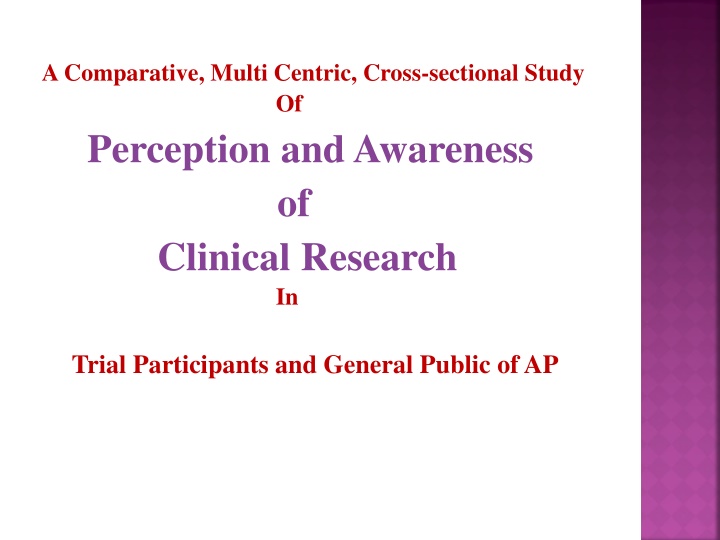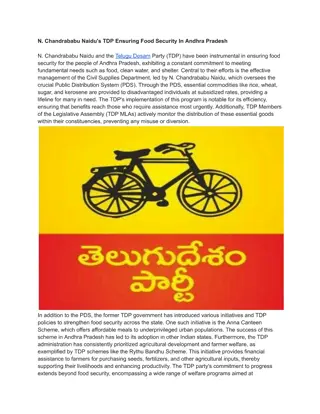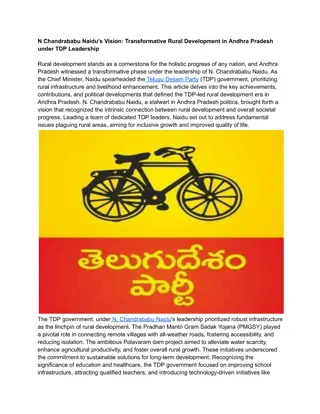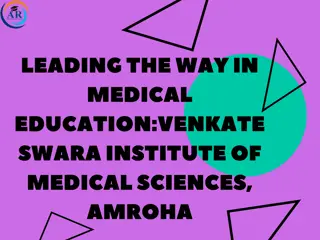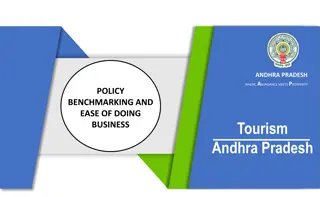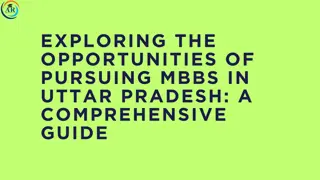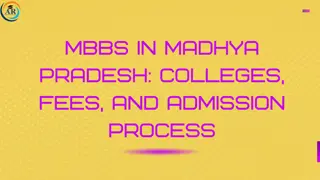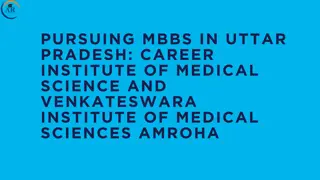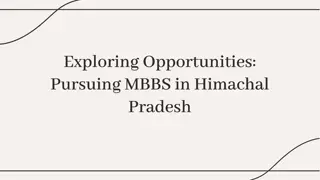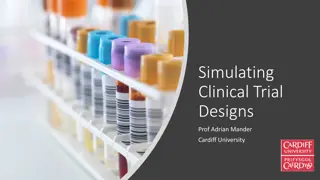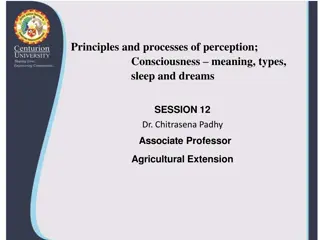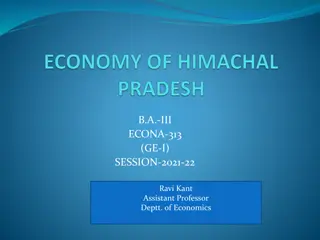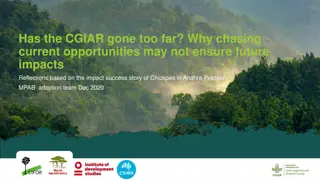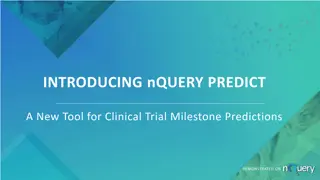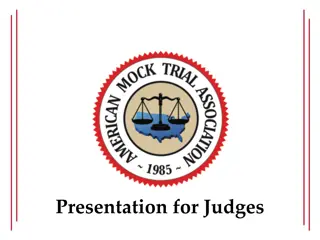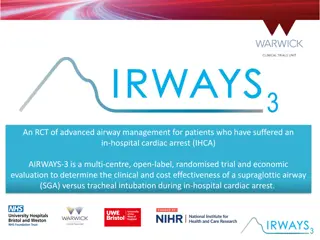Perception and Awareness of Clinical Research in Trial Participants and the Public of Andhra Pradesh
This study focuses on understanding the perception and awareness of clinical research among trial participants and the general public in Andhra Pradesh. It highlights the importance of creating awareness about clinical research, previous study results, public attitudes towards clinical trials, and efforts to promote public awareness through media campaigns. The findings emphasize the need for improving public understanding and participation in clinical research.
Download Presentation

Please find below an Image/Link to download the presentation.
The content on the website is provided AS IS for your information and personal use only. It may not be sold, licensed, or shared on other websites without obtaining consent from the author.If you encounter any issues during the download, it is possible that the publisher has removed the file from their server.
You are allowed to download the files provided on this website for personal or commercial use, subject to the condition that they are used lawfully. All files are the property of their respective owners.
The content on the website is provided AS IS for your information and personal use only. It may not be sold, licensed, or shared on other websites without obtaining consent from the author.
E N D
Presentation Transcript
A Comparative, Multi Centric, Cross-sectional Study Of Perception and Awareness of Clinical Research In Trial Participants and General Public of AP
INTRODUCTION Clinical research helps us determine the safety and efficacy of medications, devices, diagnostic products intended for human use. The design and conduct of the trial is dictated by the protocol & approved by regulatory authorities The data thus collected is scientifically analyzed to reach a valid inference The most challenging area in Clinical Research is : finding eligible and compliant subjects for willful participation .
NEED TO CREATE AWARENESS Important steps in clinical research Public should know Public should understand Public should participate
WHAT IS NEWSWORTHY? LONGITUDINAL STUDY OF THE REPORTING OF MEDICAL RESEARCH IN TWO BRITISH NEWSPAPERS. BMJ Current public understanding of clinical research is poor and media coverage of clinical research trials is often negative Bartlett C, Sterne J, Egger M
PROMOTING PUBLIC AWARENESS OF RANDOMISED CLINICAL TRIALS USING THE MEDIA: THE GET RANDOMISED CAMPAIGN There is agreement in the literature that one of the major barriers to recruitment and enrollment of patients in clinical trials is patients' lack of awareness about clinical trials. Isla S Mackenzie, Li Wei, Daniel Rutherford et al
ATTITUDES TOWARD CLINICAL TRIALS AMONG PATIENTS AND THE PUBLIC Responses differed neither by subgroup nor by demographic variables. {104 cancer pts, 84 cardiology pts, and 107 general public} Most respondents (71%) believed that patients should serve as research subjects Cassileth BR, LuskEJ, Miller DS, Hurwitz S
PARTAKE STUDY Results suggest the Indian public is aware of some key features of clinical research like: purpose/ value/ voluntariness and supports clinical research in general But is unaware of other key features like: Compensation/confidentiality/protection of human participants & Exhibits some distrust in the conduct and reporting of clinical trials PARTAKE Survey of Public Knowledge and Perceptions of Clinical Research in India (Delhi)
ATTITUDES TOWARDS CLINICAL RESEARCH AMONGST PARTICIPANTS AND NONPARTICIPANTS. J INTERN MED Trial participants were, as compared with nonparticipating respondents, more positive towards both participation of self and others. Both personal and altruistic motives for participation were highly rated. Primary reasons for nonparticipation were *fear of the unknown and/or *unease with randomization Madsen SM, Mirza MR, Holm S, Hilsted KL, Kampmann K, Riis P (Copenhagen University )
RESULTS OF HARRIS INTERACTIVE SURVEY : 1)Awareness changes attitude toward clinical research 2) Helps participant make an informed decision 3) Improves overall trust in the clinical research
OBJECTIVES OF OUR STUDY : To determine the areas in which there is LACK of perception & awareness of clinical trial in both groups (TP) & (NTP) To determine the areas in which there is GAP of perception & awareness of clinical trial between both groups (TP) & (NTP) To determine ways and means for bringing about better awareness in both groups {{TP trial participants, NTP----non trial participants}}
MATERIALS & METHODS Protocol was designed and an approval from Institutional Ethics Committee was taken Sample size was calculated and found to be 165 in each group. {Assuming 70% of awareness with 95% of confidence interval (C.I), 20% relative precision with a design effect of 2}. Designed a Questionnaire and EC approval taken Recruitment process discussed for TPs and NTPs Data collection procedure finalised Statistical Analysis discussed
LITERACY TP NTP Illiterate 9% 9% 1-12 class 61% 61% Graduate 30% 30% COMPARABLE GROUPS
PURPOSE AND SOURCE OF INFORMATION ABOUT CLINICAL RESEARCH Purpose TP NTP Help in Research 74% 57% Financial Benefit 21% 32% Others 5% 11% Source of Information Friends/ Relatives/ Participated subject Advertisements Others (Doctors etc ) TP 81% NTP 53% 5% 13% 16% 28%
Awareness on Clinical Research TP Awareness NTP Medicines using today were part of clinical trials earlier 85% 60% Clinical research an essential step for developing new treatment 86% 62% of diseases Trials conducted globally for better treatment of diseases 88% 60% Many people participating in clinical trials all over the world 89% 54% Confidentiality of the participants personal information will be 97% 47% maintained Drugs tested thoroughly for its safety before using it 97% 62% Leaflet that comes with medicine prepared based on clinical trial 89% 53% results Pharmaceutical companies spend billions of rupees on clinical 91% 53% research Take years for a drug to come into market 81% 61% Surveillance by regulatory bodies even after the drug approval 74% 42%
Awareness on Elements of Consent Form 98% 98% 98% 98% 79% 64% 53% 52% 41% 27% 27% 20% Informed Consent form ICF read in comfortable language Consenting process Consenting process for illiterates (LAR/IW) Voluntary participation Withdrawal during the trial TP NTP TP=Trial Participants; NTP=Non-Trial Participants (General public). Participation se with Audio-Video Consenting TP- 56% Believe NTP- 73% Don t believe
Ethics Committee 100% 80% 60% 40% TP NTP 20% 0% Awareness on Existence of Ethics committee in hospitals Awareness regarding governments overview on participants safety TP=Trial Participants; NTP=Non-Trial Participants (General public)
Financial transaction TP (%) NTP(%) Food and transport 34 37 Reward for participation 33 41 Transport, food and reward for 12 - participation Transport, food and others 14 - Others 7 22
Awareness on Risks Vs Benefits 98% 97% 93% 90% 73% 51% 49% 47% Drugs have side effects Clinical research only way to evaluate side effects Free medication for side effects AE's and SAE's taken care of by research staff TP NTP TP=Trial Participants; NTP=Non-Trial Participants (General public)
Knowledge on who will be the beneficiary in Clinical Trials Beneficiary TP NTP Participants 7% 13% Pharmaceutical company 12% 36% Society 70% 49% Society and Pharmaceutical company 6% 2% Society and participants 5% -
PUNE VS HYDERABAD STUDY Source of Information: Hyderaba d 81% Pune Friends/ Relatives/ participated subjects Doctors / Clinics 28% 13% 72% Awareness on Risks and Benefits Hyderaba d 93% 95% Pune Risks involved in clinical Research Benefits in clinical Research 60% 75% Need to create awareness: Pune: 97%; Hyderabad: 81%
CONCLUSION According to our survey it was concluded that the awareness on clinical research is low in our society especially in the areas of: 1) elements of consent form and consenting process, 2) Confidentiality in Clinical Research 3) Regulatory machinery of the clinical research.
